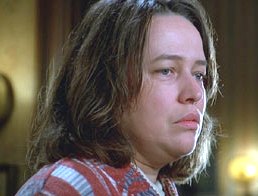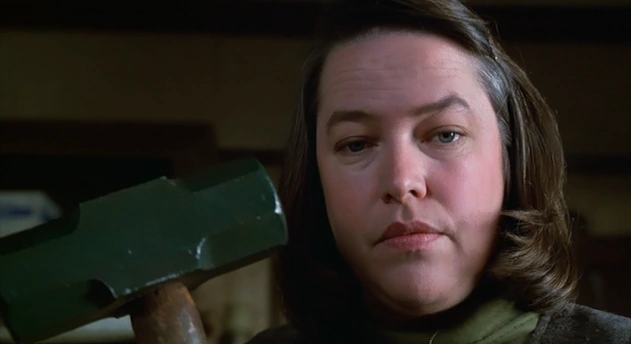*Note: This is NOT a professional diagnosis and is NOT meant to reflect on sufferers of mental illness.
Once upon a time, author Paul Sheldon was driving a snowy road after completing a new book for his Misery series. He doesn't reach his destination, however, and crashes his car in the snow, leaving his legs broken.
Paul finds himself rescued by and in the home of Annie Wilkes, a former nurse and his "number one fan." She assures him that he will be taken to the hospital, but all of that changes for the worst after Annie reads his latest book. Misery has been killed off in the series, and Annie has no intention of letting Paul go anywhere. Now he has to write a new book and bring Misery back to life. But even then, Annie may be too obsessed with Paul and his books to let him go. Will Paul Sheldon escape, or will he spend the rest of his life in misery with Annie Wilkes?

From the time when we meet Annie Wilkes up to when her fury is unleashed after Misery's death, we are given a hint pertaining to her mentality. She criticizes the swearing in Sheldon's books, but her criticism escalates into what almost looks like anger. After her insanity is revealed when Misery dies, the audience and Paul anticipate whatever may put Annie in a rage once again. This is how we get to know Annie's point of view. Annie is religious, but it isn't obvious other than Annie's refusal to swear. Annie's problem is that some things that are not meant to be real become all too real for her, (or she at least takes them far too seriously,) such as Misery's death in Paul's book, and when the ending from one week's chapter play changed the following week. These types of things make Annie violently upset, and she is often left feeling cheated and sees these things as very unfair.

After watching the majority of Misery we know that Annie's condition is ego-syntonic, meaning that Annie doesn't think seem to think or acknowledge she has mental problems, and acts as though other people, (such as Paul and the people that make the chapter plays,) are the problem instead of her. She does have some self-awareness when she says that she "gets so worked up," and "I don't think I'd better be around you for a while," and "I'd better go now. I might put bullets in it." But that isn't enough to keep the rest of Annie's psychological problems at bay. When Misery died in the book, Annie thinks that Paul murdered her. Annie's referring to Misery as "my Misery," is a continuous reminder of Misery's reality to Annie and that something in Annie's mind is not quite right. We know from her scrapbook that Annie killed her father, a college roommate, and patients when she was a maternity nurse in a hospital. Whether genetic, environmental, or both, the causes of Annie's unstableness are unknown.
Annie Wilkes is not a psychopath, neither is she a sociopath. She would be able to sympathize as well as empathize with certain people or when given the opportunity. Despite killing people as a nurse, the fact that she even was one confirms that she can sympathize in some way. Annie, however, suffers from some delusions: "God came to me last night and told me your purpose for being here. I am going to help you write a new book." She does not have multiple delusions. The few that Annie has involve God and/or her love of Paul and Misery: "You see I've known for some time why I was chosen to save you. You and I were meant to be together forever. Now our time in this world must end."
Annie does not quite fit the characteristics of a personality disorder. Her moods can change quickly and intensely, but they are consistent with her thought patterns. She has depression to some degree, since at one point in the film she expressed thoughts of suicide to Paul. We don't why but Annie Wilkes is somehow broken, and one would pity her for that. Other than that, a possible but not definite diagnosis: A sad and simple case of psychosis.
Do you agree with this? Be sure to comment, share, and follow to come back for more on ETF!
